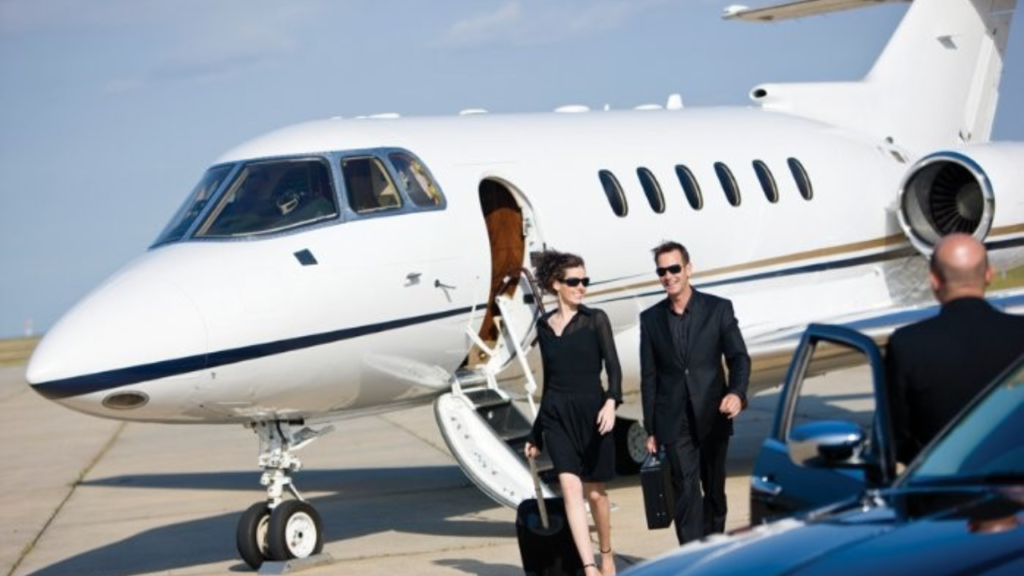Jetiquette 101: Essential Etiquette for Corporate Aviation Security Professionals

In the high-stakes world of corporate aviation security, technical skills and vigilance are paramount. However, there’s another crucial aspect that often separates exceptional professionals from the rest: Jetiquette. This blend of “jet” and “etiquette” encompasses the refined conduct and personalized service essential in corporate aviation. For security professionals, mastering Jetiquette is not just about politeness—it’s a critical component of effective client protection and operational success. This blog post delves into the core elements of Jetiquette, focusing on cultural sensitivity, professional conduct, discretion, confidentiality, communication skills, and personalized service for high-profile clients.
The Foundations of Jetiquette:
Jetiquette in corporate aviation security goes beyond basic manners. It’s a comprehensive approach to client interaction that enhances security operations while ensuring client comfort and satisfaction. Key components include:
1. Cultural Sensitivity and Professional Conduct
2. Discretion and Confidentiality
3. Advanced Communication Skills
4. Personalized Service for VIP Clients
Let’s explore each of these crucial areas in detail.
1. Cultural Sensitivity and Professional Conduct:
In the global arena of corporate aviation, cultural sensitivity is non-negotiable. Security professionals must navigate diverse cultural norms while maintaining the highest standards of professional conduct.
Key aspects include:
• Understanding and respecting cultural differences in greetings, personal space, and communication styles
• Adapting security protocols to align with cultural sensitivities without compromising safety
• Maintaining a professional demeanor that transcends cultural boundaries
Case Study: A security team working with Middle Eastern clients implemented a training program on regional customs and etiquette. This resulted in a 30% increase in client satisfaction scores and improved operational efficiency during international flights.
Best Practices:
– Conduct thorough research on client cultural backgrounds before assignments
– Develop a global etiquette handbook for your security team
– Regularly update cultural sensitivity training to reflect current global dynamics
2. Discretion and Confidentiality:
The nature of corporate aviation security demands the utmost discretion and confidentiality. High-profile clients expect their privacy to be guarded as fiercely as their physical safety.
Essential elements include:
• Maintaining strict confidentiality about client identities, travel plans, and personal information
• Exercising discretion in all communications, both on and off duty
• Understanding the legal and ethical implications of information handling in various jurisdictions
Expert Insight: “In corporate aviation security, a single indiscretion can irreparably damage client trust and your professional reputation,” warns Maria Rodriguez, a veteran in VIP protection.
Strategies for Enhancement:
– Implement rigorous confidentiality agreements and regular compliance checks
– Train staff in social media best practices to prevent inadvertent information leaks
– Develop secure communication protocols for sharing sensitive information
3. Advanced Communication Skills:
Effective communication is the cornerstone of Jetiquette. Security professionals must master both verbal and non-verbal communication to excel in their roles.
Critical skills include:
• Clear and concise communication of security procedures to clients and crew
• Active listening to understand client needs and concerns
• Non-verbal communication awareness, including body language and facial expressions
• Ability to communicate effectively in high-stress situations
Training Focus: Our Corporate Aircraft Security Course includes a module on “Communication Excellence in Aviation Security,” which covers advanced techniques for clear, professional, and situationally appropriate communication.
Practical Tips:
– Practice scenario-based communication drills regularly
– Develop a standardized communication protocol for your team
– Invest in language training for international operations
4. Personalized Service for High-Profile Clients:
The hallmark of exceptional Jetiquette is the ability to provide personalized service that makes each client feel uniquely valued while maintaining robust security measures.
Key elements include:
• Anticipating client needs before they arise
• Tailoring security approaches to individual client preferences without compromising safety
• Balancing professionalism with approachability to build client trust
Success Story: A corporate security team implemented a client preference database, allowing them to customize security protocols for recurring VIP clients. This initiative led to a 40% increase in client retention and numerous referrals.
Strategies for Excellence:
– Develop detailed client profiles including preferences, concerns, and past feedback
– Implement a system for gathering and acting on client feedback after each journey
– Train your team in the art of “invisible service” – being ever-present yet unobtrusive
Integrating Jetiquette into Security Operations:
To truly excel in corporate aviation security, Jetiquette must be seamlessly integrated into all aspects of operations. This involves:
• Incorporating Jetiquette principles into standard operating procedures
• Regular training and role-playing exercises to reinforce Jetiquette skills
• Creating a culture that values both security excellence and client service equally
Training and Development:
Mastering Jetiquette is an ongoing process that requires dedicated training and continuous improvement. Our Corporate Aircraft Security Course offers a comprehensive module on Jetiquette, covering:
– Cultural sensitivity and global etiquette
– Advanced communication techniques for high-stress environments
– Legal and ethical aspects of confidentiality in corporate aviation
– Personalized service strategies for VIP clients
This training equips security professionals with the tools to elevate their service while maintaining the highest security standards.
In the world of corporate aviation security, technical prowess alone is not enough. The art of Jetiquette—blending cultural sensitivity, professional conduct, discretion, effective communication, and personalized service—is what distinguishes truly exceptional security professionals. By mastering these skills, you not only enhance the safety and satisfaction of your clients but also elevate your own career prospects in this competitive field.
Are you ready to transform your approach to corporate aviation security? Enroll in our Corporate Aircraft Security Course today and master the art of Jetiquette alongside crucial security skills. Visit to learn more and register. Don’t just secure your clients—impress them with your professionalism and finesse. Elevate your career in corporate aviation security by mastering Jetiquette today!

